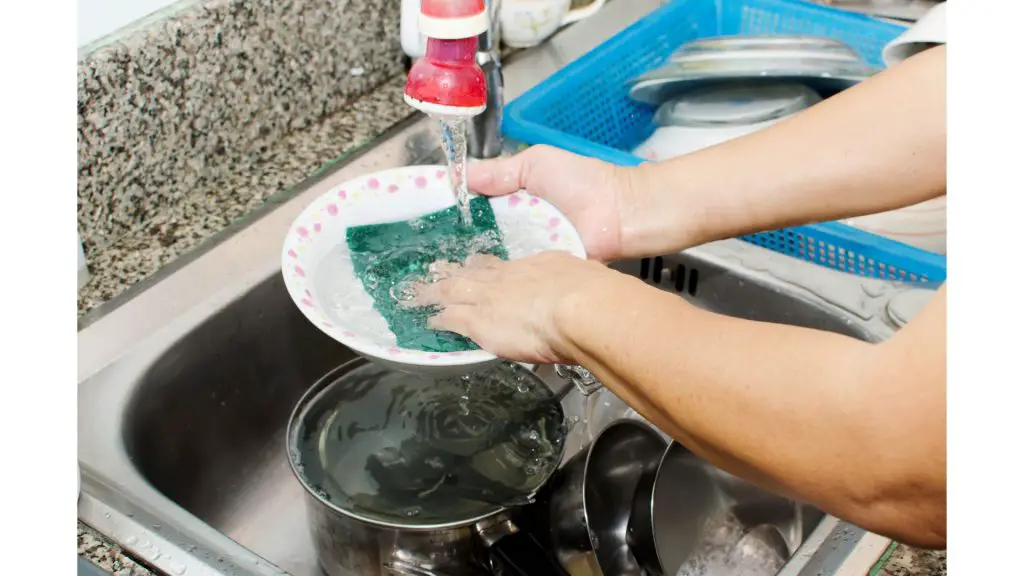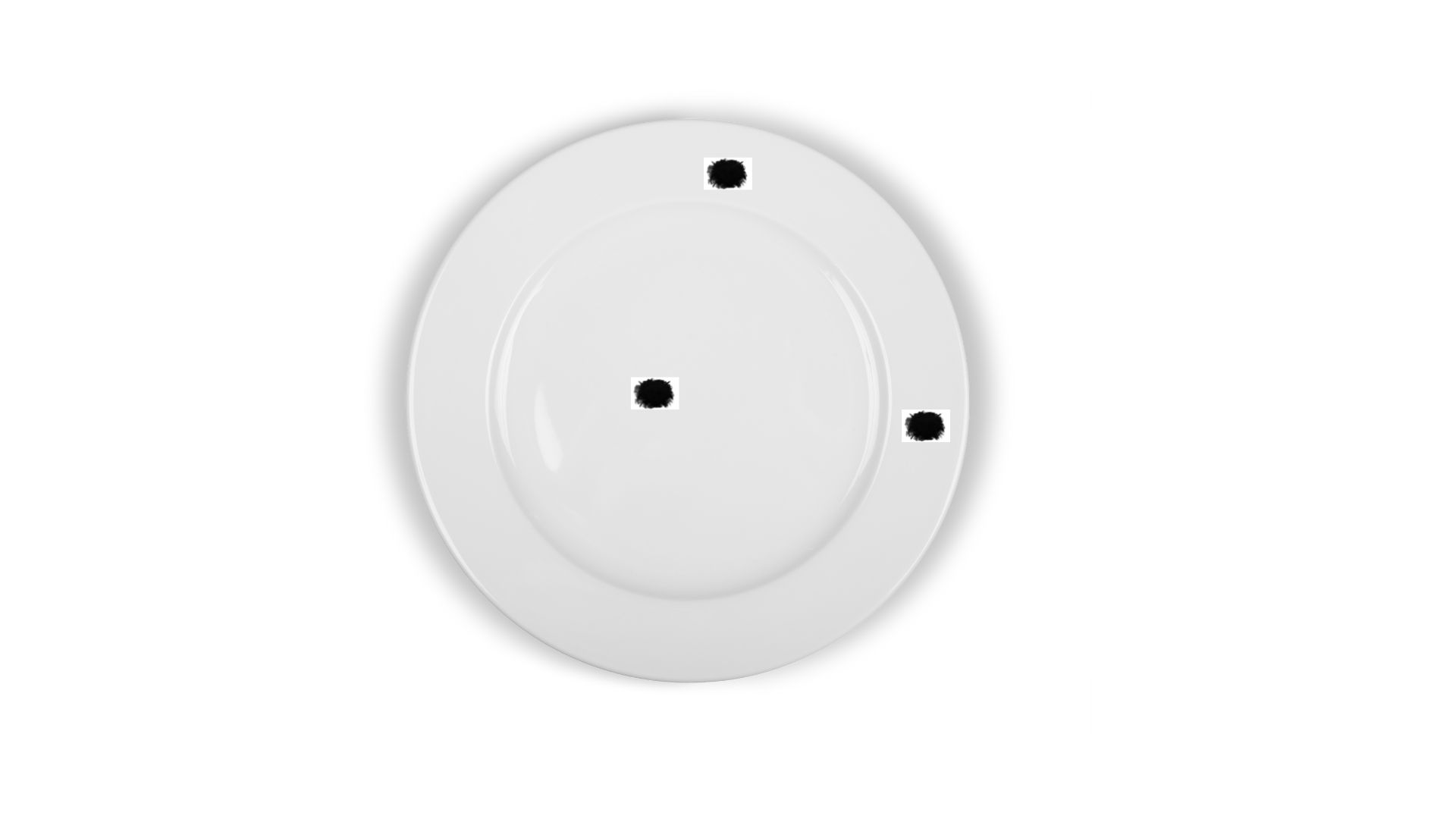Don’t allow the black marks to scare you when you retrieve your dishes from the dishwasher. The following factors are usually at fault:
1). The Dishes Are Dirty

You expect the dishwasher to remove all the food particles on your dishes. But what if the appliance falls short? What if clogged spray arms and power issues prevent the dishwasher from removing every speck of food?
The dishwasher’s high temperatures will burn the dirt and grime that remain, creating an unpleasant residue. You can blame this issue on short wash cycles and insufficient or low-quality detergent.
2). The Dishwasher Has Mold
Utensils in a clean dishwasher will emerge spotless. On the other hand, a dirty dishwasher will corrupt the utensils with its grime. Your biggest concern is mold. The New York Times wants you to look for black spots, streaks, and growths in the internal compartment because they signify mold and mildew.
Mold is easy to ignore. After all, it won’t harm healthy individuals, especially adults. But if it goes unchecked, a mold infestation will compromise the dishwasher’s efficiency, creating the problem mentioned above where high temperatures keep burning food particles on the dishes because the dishwasher has failed to clean the utensils to your satisfaction.
3). The Dishwasher is Dirty
Laypeople typically think of mold when you mention dirty dishwashers. However, sometimes, your dishwasher is just dirty. Food particles are stuck in the drain or basket filler. Why is the residue on the dishes black?
Because the food particles have decayed. Don’t be surprised if the dishwasher develops a nasty smell. Decaying matter in a dishwasher is a health hazard.
4). The Dishwasher Has Hard Water Deposits
Scaling affects dishwashers in most corners of the globe. Hard water leaves mineral deposits that corrode the dishwasher’s metallic components, lowering the machine’s efficiency and reducing its lifespan.
If you don’t remove the deposits, they will leave black spots and marks on your utensils. The higher the concentration of minerals, the more deposits you will notice.
4). You Used Too Much Detergent
If you do your own laundry, you know that excess detergent leaves unsightly marks on your clothes. Dishes are no different. If you always follow the dishwasher’s recommendations, but the black residue persists, the quality of the detergent is to blame.
5). The Dishwasher Is Old and Worn-Out
Old dishwashers have corroded components. That corrosion can jump to the utensils during a wash cycle. If your dishwasher is relatively new, hard water can corrode these appliances. It is worth noting that corrosion makes these devices less effective.
They can’t keep your dishes clean. This will worsen the black residue because the high temperatures will burn the remaining food specks.
If There Is Black Residue On Dishes, How To Remove It?

- Scrub the dishes with baking soda and cream of tartar. These substances are gentle abrasives. They can remove stubborn stains and scuff marks.
- Fill a dirty pot with hot water and add a tablespoon of lemon juice. Let it simmer on a stove for fifteen minutes. Give it a moment to cool before pouring the water away and scrubbing or wiping the residue off with a sponge.
- Clean crusty pans by applying a layer of salt. Add water and place the pan on a stove. Wait ten minutes before allowing the pan to cool, pouring the water away and wiping the pan with a sponge.
The lemon and salt trick works with pots and pans. On the other hand, people use baking soda for grime, grease, and stains on dishes. But you don’t have to rely on this tactic. Any method that eliminates stubborn stains is acceptable.
That includes soap, water, and a sponge. You can also buy specialized stain removers for dishes, pots, and pans. Ultimately, the black residue is no different from the dirt and grime your dishwashers typically remove.
If you prefer to use the dishwasher, GE recommends a rinse agent and a water softener for consumers with extremely hard water.
How To Prevent Black Residue On Dishes From Dishwasher?

Keep the dishwasher clean. This is the most important step. A clean dishwasher is less likely to develop mold:
- Get goggles and a mask. The mask is optional. But some experts recommend it, especially for dishwashers with mold.
- Use a dry microfiber cloth to wipe the door seal. Reach into the edges and narrow folds.
- Get a clean sponge and soak it in vinegar before wiping the door seal once again. Allow the seal to sit with the vinegar for ten minutes. This will kill the fungi. You can rinse and dry the seal afterward.
- Scrub and wipe every surface inside the dishwasher with black marks, spots, and streaks.
- Some people run a wash cycle in an empty dishwasher, but they add apple cider vinegar to kill bad smells and eliminate clogging. Others use baking soda and bleach, and they run the wash cycle several times to kill the bacteria.
But a thorough washing won’t solve all your problems. The following steps will prevent the dishwasher from leaving black marks on your dishes:
1). Use the correct detergent in the appropriate amount. Detergents have instructions that recommend the correct amount to use for each situation. You can also follow the dishwasher’s instructions.
2). Follow the instructions while loading the dishwasher. Sometimes, the appliance fails to clean the dishes because you loaded it poorly. Place each item at the correct level.
3). Don’t overload the appliance. Otherwise, the machine won’t clean all the dishes. Additionally, you can’t use a quick cycle when the dishwasher is full.
4). Arrange the dishes in a way that doesn’t block the spray arms. Allow them to rotate freely.
5). Is the water pressure sufficient? Poor water pressure can prevent the dishwasher from cleaning the dishes. Check, fix, and replace defective valves. Inspect the pipes for kinks. Hire an expert to troubleshoot the plumbing, especially if you opened the faucet in the sink and the pressure was too low.
6). Clean the filter routinely. The filter will prevent large food particles from flowing into the drain. This debris can create blockages when it accumulates. It can also attract mold when it decays. Therefore, you should check the filter regularly, cleaning it when the need arises.
7). Are the spray arms working? Can they spin freely? If they corrode, replace them. Otherwise, you can’t trust the dishwasher to keep your dishes clean. Sometimes, clogging is the problem. Fortunately, you can unclog blocked spray arms without hiring a technician.
8). You can’t avoid hiring an expert if your dishwasher is old. According to Synchrony, these appliances can last 20 years. But you should worry if you bought yours ten or more years ago. You don’t necessarily need a technician to fix the black residue. You can probably perform that task yourself.
Instead, you want the technician to tell you whether the dishwasher can be salvaged. You can replace every faulty component in the appliance, including the hoses, spray arms, valves, motors, and sensors.
But repairs are a waste of money if the appliance has reached the end of its lifespan. A professional will determine whether you should repair or replace the dishwasher. This debate doesn’t matter if you have a warranty. Take advantage of the free repairs or the replacement dishwasher the warranty can get you.
9). If you have hard water in your region, use a water softener to protect the appliance from scaling. A water softener removes the excess minerals that cause scaling. If you can’t afford a softener, descale the machine routinely to prevent the mineral deposits from corroding the machine.
10). Remove excess food particles before you place the dishes in the dishwasher. Don’t add plates filled with leftovers to the appliance.

